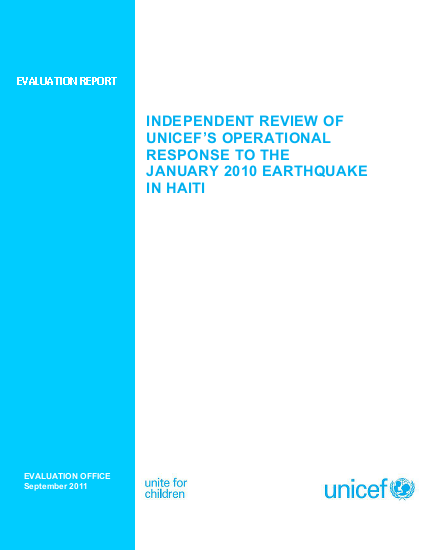
This review was conducted from November 2010 to February 2011. While following an evaluative approach, it did not constitute a full-scale evaluation aimed at exhaustively documenting the results UNICEF achieved or did not achieve for children and women in Haiti or the many factors that have affected its response since this extraordinary disaster. Rather, it focused more narrowly on identifying key internal systemic factors that helped or hindered UNICEF’s response in the first three months after the earthquake. Its recommendations thus concentrate on the operational performance of UNICEF’s internal system for emergency response. Overall, the review team found UNICEF’s early response to be marked by rapid reaction in the earthquake’s immediate aftermath, followed by inconsistent performance soon thereafter. UNICEF-led clusters were activated immediately – but, with the exception of the water, sanitation, and hygiene cluster, their leadership remained weak and unclear.
Links
Resource collections
- Evaluating humanitarian action
- Monitoring and Evaluation (M&E)
- Monitoring of humanitarian action
- Topics
- UN Habitat - Urban Response Collection
- Urban Response - Urban Crisis Preparedness and Risk Reduction
- Urban Response Collection - Community Engagement and Social Cohesion
- Urban Response Collection - Economic Recovery
- Urban Response Collection - Environment and Climate Change
- Urban Response Collection - Housing, Land and Property
- Urban Response Collection - Urban Crisis Response, Recovery and Reconstruction
- Urban Response Collection - Urban Resilience